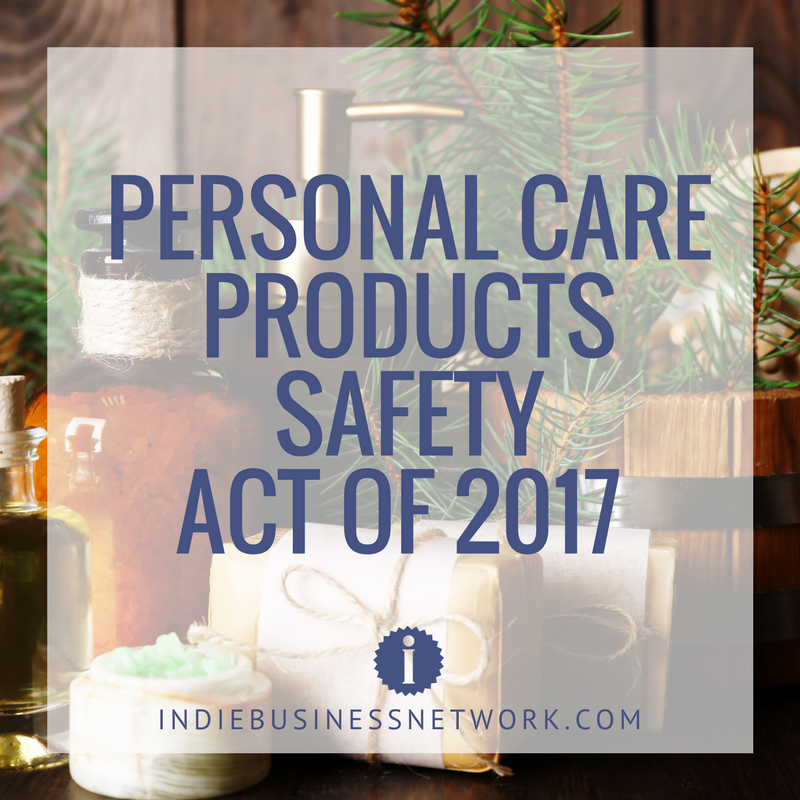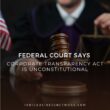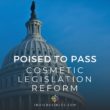For nearly a decade, this blog has recounted the journey of multiple pieces of proposed legislation designed to amend cosmetics laws in the United States. This post is the latest in that series. Yesterday, Senators Susan Collins (R-ME) and Dianne Feinstein (D-CA) introduced the Personal Care Products Safety Act of 2017. A bill with the same name had been introduced in 2015 as I told you here, but that version is no longer under consideration.

For those who may be new to this journey, these legislative efforts are not new. They go all the way back to the proposed FDA Globalization Act of 2008, which never became law. If you're interested, you can binge on the posts going back to 2008 in the Law and Advocacy category of this blog.
The purpose of this post is to provide a summary of the newly introduced legislation. It is not a complete summary. It is a high level overview.
Bear in mind that the legislation is not the law of the land. It must go through multiple hearings before it becomes law, if it ever becomes law. Currently, the bill is pending in the United States Senate Committe on Health, Education, Labor and Pensions.
Before I dive in, I want to shout out to longtime IBN member Anne-Marie Faiola, founder and CEO of Bramble Berry and leader at Coalition of Handcrafted Entrepreneurs, for her tireless efforts to meet with lawmakers and their staff to ensure that any new laws are narrowly tailored and do not unnecessarily burden small businesses like the members of the Indie Business Network.
I have read the proposed legislation, but I need to read it again to dive more deeply into the details. As I do that, I wanted you to have an introductory look at it, as I continue to slice and dice the bill.
I will update this post as needed to clarify anything. Meanwhile, if you have any questions, you can post them below. (IBN members, feel free to use IBN's private Facebook group if you wish to discuss things more privately. If you are not a member, you can join here.)
Why New Cosmetic Laws?
In the United States, cosmetics are regulated by federal Congressional statutory law under the Food, Drug, and Cosmetic Act. (A few states have their own laws, but they are beyond the scope of this post.)
Federal cosmetic laws are enforced by the Food & Drug Administration (the FDA), an arm of the Department of Health and Human Services. While the FDA's rules and regulations have been updated frequently over the years, the federal cosmetic law itself has not changed since passage of the Food, Drug, and Cosmetic Act of 1938.
While cosmetics made and sold in the US have a great safety record, it has been clear since 2008 that lawmakers see a need to update them.
Our goal throughout this nearly decade-long process has been to minimize any unnecessary adverse impact on small cosmetics companies like Indie Business Network members.
From a high level perspective, the proposed legislation does six things (well, really more than that, but we're starting with these):
- ensures the reporting to FDA of serious adverse events resulting from the use of a cosmetics
- requires that cosmetics “facilities” register their facilities with the FDA
- funds the FDA
- requires certain product labeling designed to inform consumers about ingredients and manufacturer details
- prohibits states and political subdivisions from establishing or continuing certain cosmetic laws, unless they were already in effect at the time of the passage of the new federal law
- requires FDA to make Good Manufacturing Practices mandatory, with consideration made for small businesses as appropriate
This post is not going to dive deeply into the specifics of those proposed requirements.
Instead, I will focus on the provisions of the bill from which smaller companies are either exempt, or, if not exempt, subject only to streamlined compliance requirements.
But first, one requirement that applies to everyone, regardless of size or anything else. Everyone must report serious adverse events to the FDA.
Serious Adverse Event Reporting
No cosmetic company, regardless of how big or small, is exempt from the requirement to report the occurrence of “serious adverse events” to the FDA. All serious adverse events, defined as those events that cause serious bodily harm, disfigurement, or death, must be reported to the FDA. There are no exemptions whatsoever from this requirement.
Registration Requirement
Currently, registration of cosmetic companies with the FDA is voluntary under the Voluntary Cosmetics Registration Program (VCRP).
The proposed law would make registration mandatory, but small companies enjoy either an exemption from this registration requirement, or a very streamlined version of this registration. Here's how it pans out.
- if you make your products in a private residence that meets the customary expectations of a private residence, and you have annual sales of less than $1,000,000 (annually, over the previous 3 years), you need not register.
- if your business has average annual sales of between $500,000 and $2 million (annually, over the 3 previous years) and/or your business is located in a private residence and generates over $1 million (annually, over the 3 previous years), you would only be required to register your business name, address, phone, email (if available), and consumer product line categories (not individual products).
Either way, the registration exemption/streamlined registration provision does not apply if you make any of these four things:
- products intended for application to the eye
- lip products containing color
- products intended for internal use
- products that alter the appearance of the skin or body for more than a 24 hours period.
In those cases, the regular registration requirements would apply.
FDA Funding
There are user fees in this bill, but certain classes of small businesses are exempt from those fees.
Small businesses (defined as those with average annual sales of between $500,000 and $2 million (annually, over the 3 previous years), or as businesses located in a private residence with annual sales totaling less than $1 million (annually, over the 3 previous years), are exempt from user fees under the proposed legislation.
Even so, you are not exempt from user fees if you make any of these four things:
- make products intended for application to the eye
- make lip products containing color
- make products intended for internal use
- make products that alter the appearance of the skin or body for more than a 24 hours period.
Ingredients
If passed, the law would require FDA to evaluate a minimum of five ingredients per year to determine their safety and appropriate use, and provide companies with clear guidance about whether ingredients can and should be used in cosmetics, and to what extent. There are also other ingredient-related requirements, such as posting of product ingredients on websites where buying customers can see them. (I recommend this practice, even though it is not a requirement of current cosmetics law.)
Preemption
Th bill contains a provision prohibiting states and political subdivisions from establishing or continuing in effect certain types of cosmetic laws, unless they were already in effect at the time of the passage of the new federal law. This is an especially valuable part of this bill because it helps to prevent the patchwork quilt of confusion that would result if 50 states were able to pass 50 different cosmetics laws, thus making it nearly impossible for anyone to run a business. This provision does not affect laws in states and political subdivisions that are already in place at the time of the passage of the bill.
Good Manufacturing Practices
Currently, the FDA's Good Manufacturing Practices are voluntary guidelines, not laws.
Under the proposed law, the FDA, in consultation with the Small Business Administration, would be directed by Congress to create Good Manufacturing Practice laws, and those laws will be required to be simplified for small businesses based on the size and scope of their operations.
All Provisions Apply to Sales In Excess of $2M
If your business has $2M in gross sales (annually, over the previous 3 years), it is subject to all of the provisions of the bill, including registration and user fees.
Other Provisions
There are other provisions in the bill, including giving FDA the ability to order product recalls for safety reasons. (It does not currently have that authority.) It also contains a requirement that FDA evaluate a minimum of five ingredients per year to determine their safety and appropriate use, and provide companies with clear guidance about whether ingredients can and should be used in cosmetics, and to what extent.
Further Reading and Learning
Again, this blog will be updated with useful information and necessary clarifications, either via this post or a supplement to this post.
Meanwhile, you can read the text of the bill here.
Read Senator Feinstein's summary of the bill here. (I could not find one at Senator Collins's site.)
May 16: Maker Mastermind Show Devoted to New Legislation

Anne-Marie will bewas a guest on the Maker Mastermind Show, live on Facebook, on Tuesday, Mary 16, 2017 at 8:30am PT | 11:30am ET. Click here to join the Maker Mastermind Facebook group and catch the live showreplay.
Questions, Comments and Sharing
If this post has inspired you to break all the rules, build your own corporate ladder, and create the life you love, please share on share on Facebook, Twitter and LinkedIn.



